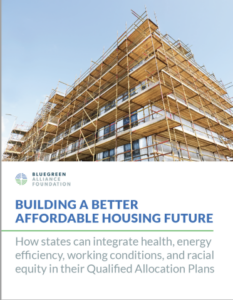50 State Report Card on Affordable Housing Policies Highlights Room for Improvement on Racial Equity, Healthy Building Practices
The BlueGreen Alliance Foundation today announced the release of a thorough analysis of measures for affordable housing investments in all 50 states and three cities. This includes both a report and a scorecard ranking all states based on their criteria for allocating Low Income Housing Tax Credits (LIHTC) through Qualified Allocation Plans (QAPs).
The report is available at: https://buildingclean.org/qap-report
“QAPs serve as a valuable tool to advance progressive solutions in affordable housing,” said BlueGreen Alliance Foundation State Initiatives Manager and report author Jeff Hurley. “This report shows there is significant room for improvement. I hope our findings will help improve states’ QAP requirements and affordable housing standards.”
The BlueGreen Alliance Foundation undertook this project to encourage states to create good jobs, protect health, and enhance equity in affordable housing. To achieve this, the report focuses on what the pillars of QAPs should be: healthy building practices, energy efficiency, worker-friendly labor standards, and racial equity.
The report found the locations with the highest overall scores in three categories were Illinois, Minnesota, Ohio, and the District of Columbia with an A-; Colorado, Michigan, Washington, and Oregon with a B+; and Delaware, Georgia, and Maryland with a B.
The report found the locations with the lowest overall scores were Maine, Kentucky, and Tennessee with an F, and Alaska, Alabama, Arkansas, California, Montana, North Carolina, Nebraska, Kansas, Oklahoma, West Virginia, and the City of Chicago with a D.
“Ultimately, this is a call for states to improve their QAP process with a focus on reducing disproportionate exposure to communities of color,” said BlueGreen Alliance Vice President of Health Initiatives Charlotte Brody. “The bottom line is that the investments we make in affordable and low-income housing should foster a healthy and equitable future for all, not just reduce energy waste and pollution.”
“While housing finance agencies have a litany of priorities to consider when developing their QAPs, this report shows that the health of residents and workers, the energy efficiency of housing developments, labor standards, and racially equitable housing policies cannot be ignored,” said Hurley.
“Just 2% of the real estate industry in the United States includes Black-led companies. Access to capital remains the most significant barrier for Black, Indigenous, and People of Color (BIPOC) developers,” said Deborah De Santis, the CEO of the Corporation for Supportive Housing (CSH). “The BlueGreen Alliance Foundation report is an important tool for understanding how jurisdictions can begin to address the systemic racism and discriminatory practices used in rental housing development and leasing and create more equitable access to housing for people who face persistent discrimination.”
